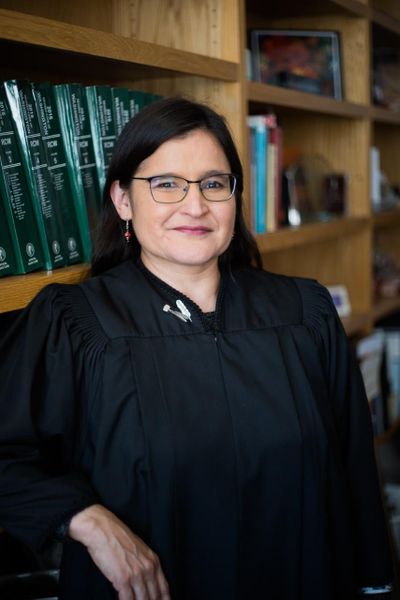Raquel Montoya-Lewis named as first Native American to Washington Supreme Court

OLYMPIA – As the first Native American to serve on the Washington Supreme Court – and only the second for any state supreme court in the nation – Raquel Montoya-Lewis expects some people will think she got the appointment because of her heritage.
“People have said that about my successes since I was in high school,” she said Wednesday after Gov. Jay Inslee named her to an upcoming opening on the state’s highest court. “My record says otherwise.”
That record includes serving as the chief judge for the Nooksack and Skagit tribes and the Northwest intertribal courts, and as an associate professor at Western Washington University. She’s in her fifth year on the Whatcom County Superior Court, to which she was appointed by Inslee and ran unopposed for election and later for re-election. She presided over felony drug court for the last two years, and teaches judges to recognize and deal with the kinds of implicit biases everyone brings to a situation.
A member of the Pueblo of Isleta tribe of New Mexico, she doesn’t shy away from her heritage.
“I come from those who survived,” Montoya-Lewis, with a ceremonial bald eagle feather in her hair, said as she stood in front of the nine current justices and Inslee. Her ancestors were subjected to genocide, being sent away to boarding schools, and other attempts to eradicate their culture. “I am here because of them.”
While Native Americans may be rare on the bench, the data shows they are “disproportionately represented on every level of the criminal justice system,” she said.
Inslee said Montoya-Lewis stood out among the applicants to replace Mary Fairhurst, the current chief justice who is retiring at the beginning of 2020 to battle cancer.
“We heard the same thing over and over,” Inslee said. “She got nothing but rave reviews … from all points of the compass.”
Montoya-Lewis, 51, was born in Spain, where her father was stationed in the U.S. Air Force. They moved every few years while she was growing up with his assignments. After a bachelor’s degree from the University of New Mexico, she came to the University of Washington for law school. After receiving her law degree, she got a master’s in social work from UW because, she said, she wanted to blend her legal training with an understanding of how the law affects people.
“The two things, to me, go hand in hand,” she said.
She applied for the opening because she considers the work the Supreme Court does critical, but she said she will miss being a trial court judge.
“I love working directly with people,” she said. “I like the drama of the courtroom” where a judge can make decisions and see the results.
Montoya-Lewis said she knows there were some people urging Inslee to select an applicant from Eastern Washington to add geographic diversity to the court. But Whatcom County is a small community that is rural in many respects.
“It’s not the same, but analogous,” she said.
Fairhurst said she was proud Montoya-Lewis was replacing her and praised the incoming justice’s commitment to equity and inclusiveness. Fairhurst’s last day will be Jan. 5; Montoya-Lewis will be sworn in as a justice and Debra Stephens as chief justice on Jan. 6.
It’s noteworthy that she’s the first Native American on the state Supreme Court, Montoya-Lewis said. “The most important thing is that I not be the last.”